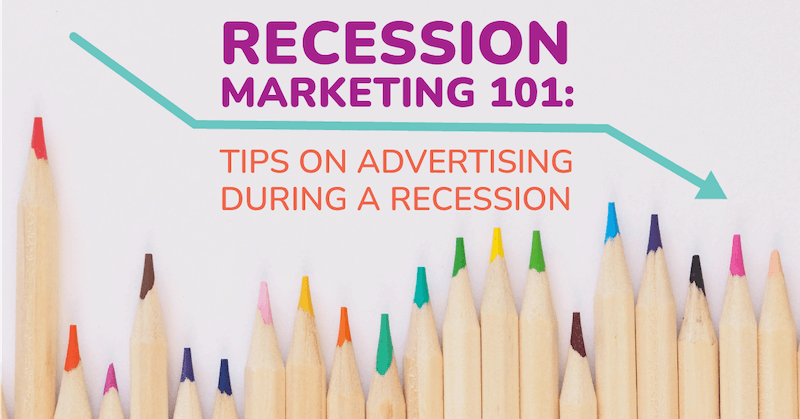Recession Marketing 101: Tips on Advertising During a Recession

Here are our top 5 tips you need to get started advertising during a recession.

Recession Marketing Tip #1: Keep going!
First and most importantly – don’t stop advertising! As we’ve discussed already, most people stop spending money on luxury items during a recession, and it might be tempting to think of advertising as a luxury rather than a necessity. If your business is a car, you could make a case that sales, not marketing, is not the gas that powers it.
But though advertising might not be the gas, it’s not a sunroof or stereo system, either. Instead, you can think of it as the oil. Sure, you can drive for a while without getting an oil change! But that can only last so long before your engine starts smoking and you have to pull over. Your car needs oil, and it needs the oil to be regularly checked and refreshed. Stopping your advertising during a recession is like trying to drive your car without ever changing the oil.
This is true even for massive global brands. You might think that these brands would be immune to large swings in market share during a recession. However, that is not the case! During the early 90s recession, McDonald’s decided to cut back on their advertising spending to save money. Taco Bell and Pizza Hut took notice and decided to take advantage of the opportunity to gain presence in the market. The result? Sales at Pizza Hut and Taco Bell increased by 61% and 40% respectively…while sales at McDonald’s declined by 28%. If one of the biggest and most recognizable brands on the planet could take such a hit by cutting back on advertising, what could that mean for smaller brands?

Recession Marketing Tip #2: Keep your messaging human
Regardless of the state of the economy, it’s generally a good idea to focus your advertising on things like values and human connection. But never is that more important than when people are struggling, like during a recession. This is true even if the consumer doesn’t end up buying what you’re selling right away. If you can get your brand on their radar in a positive way, they’ll remember you when the recession is over, and they have more money to spend.
You might think that you should focus your messaging on bargains and deals. Although that certainly has its place, a large-scale analysis by the World Advertising Research Center actually found that messaging centered around engaging emotions was more profitable than messaging focused on deals and discounts.
Getting the messaging right can be a bit of a tightrope to walk – you don’t want to come across as patronizing or taking advantage of a bad situation. But if you approach it thoughtfully, you can make a positive impression that will last long past the recession.
Recession Marketing Tip #3: Nurture your existing clients
Sometimes, you have no choice but to reduce your budget. Recessions impact individuals and businesses alike, and you can’t always avoid making a sacrifice. But even when you must cut costs, there’s more than one way to grow your business. So, if focusing on attracting brand-new clients sounds expensive or intimidating, why not shift some of your marketing budget to growing your existing clients? Exact numbers vary, but according to the Harvard Business Review, marketing to existing clients is anywhere from 5-25 times cheaper than trying to attract new ones.
Of course you’ll still want to attract new customers – you don’t want your sales funnel to dry up. But if you’re trying to cut costs, focusing more time and budget on existing clients is a great way to go. It’s Marketing 101 that a hot lead is better than a cold lead, and leads don’t get warmer than your existing clients. You won’t have the hurdle of trying to convince them to work with you – you just need to get them to invest more with you. Even a small investment in remarketing to past clients could both save you some marketing money and help you earn more.
Recession Marketing Tip #4: Diversify your offerings
This may not be an option for every business, but when times are tough, it’s worth considering if you can change what you’re offering to appeal to a lower-income audience. If your business doesn’t sell essentials, ask yourself if there’s something more essential you could offer to help you appeal to budget-conscious consumers.
If that would be too heavy a lift, consider adding in a tier lower than your current most affordable offering. Sometimes, this kind of change doesn’t even require a huge pivot. For example, a company that specializes in landscape design could start offering affordable lawn mowing services.
With some creativity and planning, a recession can be the perfect time for your company to innovate. Amazon released the Kindle during the 2008-9 recession, resulting in sales growth of 28%.
Recession Marketing Tip #5: Write content & keep your focus local
We always recommend that every business write blog posts regularly. This is especially important during a recession, for several reasons. Having a robust content library makes your website look good to Google, who will reward you by improving your site ranking. This will make your site more likely to be found by local customers who are searching for your kind of business.
There are many benefits to focusing on a more local audience during a recession. No one knows your city’s situation better than those who actually live there – so keeping your audience locally focused can help ensure that your message will resonate. Make sure your Google Business Page is current and keeps updated hours.
It’s also worth keeping in mind that the sales cycle tends to get longer during a recession. Customers want more time to decide how they spend their hard-earned money, so they generally take more time to do their research. This is where having a library of content will help you out. Publishing regularly will provide customers with assurance that you know what you’re talking about and that they can trust you. Whether the customer purchases right away or is just planning for the future, a content library is a win for your business!
We hope these recession marketing tips have helped empower you to navigate tough times. No one likes to have recession worries hanging over their head, but with the right toolkit, you can advertise with confidence.


